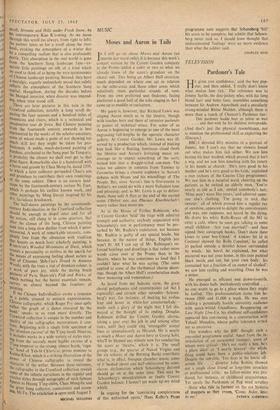MUSIC
Moses and Aaron in Tails
IF I still go on about Moses and Aaron (an interim last word only), it is because this week's concert version by the Covent Garden company at the Proms added a cubit or two to what we 'already knew of the score's grandeur on the choral side. This being an Albert Hall occasion, much depended on where one sat in relation to the echo-areis and those other areas which selectively mute particular strands of tone. From my own preferred seat (balcony, facing platform) a good half of the solo singing in Act I came up as muddle or caricature.
My guess is, however, that Richard Lewis was singing Aaron much as in the theatre, though with touches here and there of intrusive parlando at points of technical- stress. For some of us Aaron is beginning to emerge as one of the most engrossing full-lengths in the operatic character gallery. At Covent Garden, Mr. Lewis was ill- served by a production which, instead of making him look like a floating, luminous cloud (both the libretto and Aaron's levitating music en- courage us to expect something of the sort), turned him into a draggle-tailed con-man. The voice we admire in contexts from Tamino to Gerontius brings a creamy sophistry to Aaron's debates with Moses and his wheedlings of The People. But, since Aaron's line is first-cousin to Bellini's, we could do with a more Italianate tone and phrasing; and, as Mr. Lewis is apt to deliver them, those soft A flats at the end of the second scene ('Befrei uns aus Pharaos Knechtschaft) worry rather than move me.
As to the Moses of Forbes Robinson, who at Covent Garden 'held' the stage with admired strength and authority, anybody acquainted with Schoenberg's text in performance must be per- turbed by Mr. Rudkin's translation, not because Mr. Rudkin is guilty of any special boobs, but because, in the nature of things, English just won't fit. All I can say of Mr. Robinson's en- forced bawlings and drawlings is that rather more words came over at the Proms than in the theatre, where he was sometimes so loud that I couldn't hear what he was saying. (The same applied to some of the rhythmical chorus shout- ings, though the Albert Hall's reverberation made these menacing and tremendous.)
As heard from my balcony eyrie, the great choral polyphonies and counterpoints (of Act I especially) and certain other episodes—Schoen- berg's way, for instance, of making his violins leap and hover in white-hot countermelody- made such a glory of the night that I felt dis- mayed at the thought of its ending. Douglas Robinson drilled his Covent Garden chorus, taking a year over the •job in and among other tasks, until they could sing 'unsingable' atonal lines as spontaneously as Messiah. He is nearly as much a Moses and Aaron hero as Georg Solti, who'll be blamed any minute now for conducting the score as 'theatre,' which it is. The small groups (e.g., the quartet of Naked Virgins and the six soloists of the Burning Bush) contribute what is, in effect, finespun chamber music, some of it bashed about and half-obliterated by semi- chorus declamation which Schoenberg decreed should go on at the same time. This may be Schoenberg's miscalculation or faulty Covent Garden balance. 1 haven't yet made up my mind which.
In arguing for the 'convincing completeness of this unfinished opera,' Hans Keller's Prom
programme note suggests that Schoenberg 'felt' his score to be complete, but admits that Schoen- berg never said so. I should have thought that undocumented 'feelings' were no more evidence than what the soldier said.
CHARLES REID














































 Previous page
Previous page